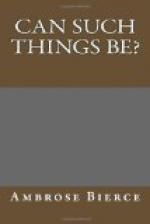The appearance of the other men was sufficiently commonplace: they were such persons as one meets and forgets that he met. All were younger than the man described, between whom and the eldest of the others, who stood apart, there was apparently no kindly feeling. They avoided looking at each other.
“Gentlemen,” said the man holding the candle and keys, “I believe everything is right. Are you ready, Mr. Rosser?”
The man standing apart from the group bowed and smiled.
“And you, Mr. Grossmith?”
The heavy man bowed and scowled.
“You will be pleased to remove your outer clothing.”
Their hats, coats, waistcoats and neckwear were soon removed and thrown outside the door, in the passage. The man with the candle now nodded, and the fourth man—he who had urged Grossmith to leave the wagon—produced from the pocket of his overcoat two long, murderous-looking bowie-knives, which he drew now from their leather scabbards.
“They are exactly alike,” he said, presenting one to each of the two principals—for by this time the dullest observer would have understood the nature of this meeting. It was to be a duel to the death.
Each combatant took a knife, examined it critically near the candle and tested the strength of blade and handle across his lifted knee. Their persons were then searched in turn, each by the second of the other.
“If it is agreeable to you, Mr. Grossmith,” said the man holding the light, “you will place yourself in that corner.”
He indicated the angle of the room farthest from the door, whither Grossmith retired, his second parting from him with a grasp of the hand which had nothing of cordiality in it. In the angle nearest the door Mr. Rosser stationed himself, and after a whispered consultation his second left him, joining the other near the door. At that moment the candle was suddenly extinguished, leaving all in profound darkness. This may have been done by a draught from the opened door; whatever the cause, the effect was startling.
“Gentlemen,” said a voice which sounded strangely unfamiliar in the altered condition affecting the relations of the senses—“gentlemen, you will not move until you hear the closing of the outer door.”




